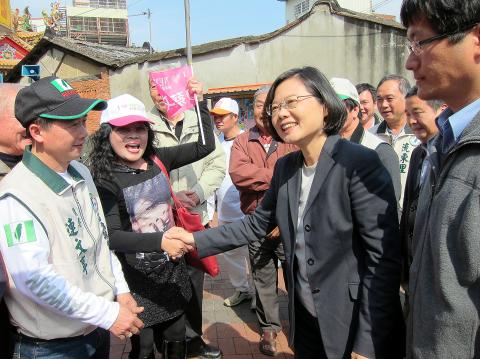The only thing standing in the way of phasing out the nuclear industry is “a lack of willpower,” Democratic Progressive Party (DPP) presidential nominee hopeful Tsai Ing-wen (蔡英文) said yesterday as she continued her weeklong critique of nuclear power.
“We have many alternative plans that I’m sure can be achieved with the right amount of hard work,” Tsai said, speaking on her “2025 nuclear-free homeland” plan for a fifth day.
“The problem is that the government is too reliant on the nuclear industry. It needs to change this attitude,” she said. “We would have 13 years left [before 2025] and I’m sure things can [be different by then].”

Photo: Ho Tsung-han, Taipei Times
Citing the dangers of nuclear power after the radiation leaks at Japan’s Fukushima Dai-ichi nuclear power plant, Tsai has proposed phasing out the industry when the operating license of the Ma-anshan Nuclear Power Plant in Pingtung County, the youngest operating facility, comes up for review in 2025.
She has also said she would seek to ensure that the Fourth Nuclear Power Plant, also known as the Longmen plant, currently under construction in Gongliao District (貢寮), New Taipei City (新北市), doesn’t become operational, pending whether the nation can increase other energy sources in time, such as through building renewable energy capacity and increasing efficiency at coal-fired power plants.
The government, as well as Chinese Nationalist Party (KMT) lawmakers, have rallied against Tsai’s proposal, saying it would waste the hundreds of billions of NT dollars already spent on the project and dramatically cut the nation’s reserve power ratio.
Tsai said such comments represented “a lack of willpower.”
“We hope to increase the ratio of renewable energy to 12 percent. The Ministry of Economic Affairs itself has set a target of 8 percent. We think that adding just 4 more percent ... is feasible,” she said.
Meanwhile, DPP lawmakers raised more questions about the safety of Taiwan’s nuclear plants by pointing to incident reports obtained from the nuclear regulatory agency.
Documents from the Atomic Energy Council show there were 15 safety violations between 2009 and this year at the three operating plants. The Longmen plant, despite it being not operational, recorded 18 incidents
during the same period.

CHANGING LANDSCAPE: Many of the part-time programs for educators were no longer needed, as many teachers obtain a graduate degree before joining the workforce, experts said Taiwanese universities this year canceled 86 programs, Ministry of Education data showed, with educators attributing the closures to the nation’s low birthrate as well as shifting trends. Fifty-three of the shuttered programs were part-time postgraduate degree programs, about 62 percent of the total, the most in the past five years, the data showed. National Taiwan Normal University (NTNU) discontinued the most part-time master’s programs, at 16: chemistry, life science, earth science, physics, fine arts, music, special education, health promotion and health education, educational psychology and counseling, education, design, Chinese as a second language, library and information sciences, mechatronics engineering, history, physical education

The Chinese military has boosted its capability to fight at a high tempo using the element of surprise and new technology, the Ministry of National Defense said in the Quadrennial Defense Review (QDR) published on Monday last week. The ministry highlighted Chinese People’s Liberation Army (PLA) developments showing significant changes in Beijing’s strategy for war on Taiwan. The PLA has made significant headway in building capabilities for all-weather, multi-domain intelligence, surveillance, operational control and a joint air-sea blockade against Taiwan’s lines of communication, it said. The PLA has also improved its capabilities in direct amphibious assault operations aimed at seizing strategically important beaches,

New Taipei City prosecutors have indicted a cram school teacher in Sinjhuang District (新莊) for allegedly soliciting sexual acts from female students under the age of 18 three times in exchange for cash payments. The man, surnamed Su (蘇), committed two offenses in 2023 and one last year, the New Taipei District Prosecutors’ Office said. The office in recent days indicted Su for contraventions of the Child and Youth Sexual Exploitation Prevention Act (兒童及少年性剝削防制條例), which prohibits "engaging in sexual intercourse or lewd acts with a minor over the age of 16, but under the age of 18 in exchange for

The High Prosecutors’ Office yesterday withdrew an appeal against the acquittal of a former bank manager 22 years after his death, marking Taiwan’s first instance of prosecutors rendering posthumous justice to a wrongfully convicted defendant. Chu Ching-en (諸慶恩) — formerly a manager at the Taipei branch of BNP Paribas — was in 1999 accused by Weng Mao-chung (翁茂鍾), then-president of Chia Her Industrial Co, of forging a request for a fixed deposit of US$10 million by I-Hwa Industrial Co, a subsidiary of Chia Her, which was used as collateral. Chu was ruled not guilty in the first trial, but was found guilty